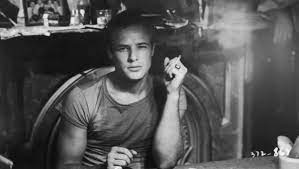
Today’s poem comes from a poet blessed with a cool name: Thom Gunn. The double-n and the quick one-two of the single syllables make him sound as much like a pirate as a poet–not that the two occupations are necessarily exclusive. Think of the samurai composing haiku after decapitating someone, for instance.
OK, don’t think of it.
The poem, “On the Move,” was inspired by a movie, The Wild One. Does that make it ekphrastic? Or just wild, man, like young Marlon Brando on his motorcycle? Having never seen the movie, it’s not for me to say, but I can say this: Poetic lines jump off the page as they do in any good poem. You don’t have to look for them. They will look for you. Exhibit A:
On the Move by Thom Gunn
On motorcycles, up the road, they come:
Small, black, as flies hanging in heat, the Boys,
Until the distance throws them forth, their hum
Bulges to thunder held by calf and thigh.
In goggles, donned impersonality,
In gleaming jackets trophied with the dust,
They strap in doubt–-by hiding it, robust–-
And almost hear a meaning in their noise.
Many people say, “I’m no poet and know nothing about it,” yet, if you shared a poem like “On the Move” with them and asked them to cite the line with greatest poetic merit, they would, 90% of the time, nail it. That is what makes poetry, poetry.
Reasonable readers may disagree, choosing the last line, for instance, but for me, it’s the line “In gleaming jackets trophied with dust.” Taking a noun (trophy) and making it do double time as a verb? Great stuff. And the fact that “dust” can become a brown badge of courage on a leather-jacketed motorcyclist? Only a poet would come up with that one.
Vroom-vroom. It’s March. Write like a wild hare in gleaming fur trophied with dust. Drive the grammarians crazy. Make the occasional word a verb in noun’s clothing.
